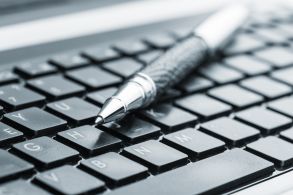Get your latest news here...
News | The pen is mightier than the (key)board
The pen is mightier than the (key)board
April 15 2024 By CTP Stationery writing

In an era of digital notetaking, punctuated by apps like Microsoft OneNote, Apple Notes, Google Keep, Notion and Obsidian, it's easy to think that physical notetaking no longer has a place. But as research is now revealing, taking notes with a pen and paper is still the best way to record information.
A recent study by Frontiers in Psychology set out to investigate the implications of digital notetaking on the human brain.
Researchers monitored brain activity in students taking notes and found that those students writing notes by hand had higher levels of electrical activity across a wide range of interconnected brain regions responsible for movement, vision, sensory processing and memory compared to those taking digital notes.
The findings add to a growing body of evidence that recording information physically with a pen and paper, as opposed to on digital tablets or laptops, delivers greater cognitive benefits.
One of the primary reasons for this is that the extra time needed to handwrite notes (you can type more in a minute than you can write) gives your brain extra time to digest the information being recorded. As opposed to trying to capture every word, writers only record the most salient information, which the brain then stores.
Based on years of research in various academic settings, the most notable benefits of physical notetaking include:
Better focus
It's easy, when typing word for word transcription style, for typing to become monotonous and for attention to wonder. When writing, however, attention is highly focused, as on the backend the brain scrambles to listen to the information, process it and paraphrase or summarise it to keep up with the flow of information. It's an engaged process that results in a more active participant.
Improved understanding
Because writers use short-hand or summarise information as it's being delivered, the brain is constantly processing the information and sorting through it. It is making sense of the information as it chooses what to write down and what to leave out. This makes for a better understanding of the information from the outset, and encourages natural critical thinking of the information being recorded.
Expanded recall
By the brain sifting through information as it's being written, it automatically chooses the most important points to capture, making that information easier to remember. With digital notes, the brain is confronted with every word that has been typed, which leads to more of a general recall as opposed to the recall of specific points. The digital note-taker still needs to mine their notes to identify the factual nuggets later on - a step the brain automatically did when writing the notes in the first place.
Increased retention
When physically taking notes, it's common for people to doodle. Although this seems like a distraction, research shows that doodling or using visual cues as part of notetaking enhances information retention. The brain processes information in different ways, and some topics are better expressed (and therefore understood and retained) as visual notes than written ones. Digital notetaking doesn't allow for this process to take place, which for some brains is the only way to ensure information retention.
Pen and paper might be considered by some to be old school, but the merits of this physically engaging activity shouldn't be underestimated, even in our digital age.